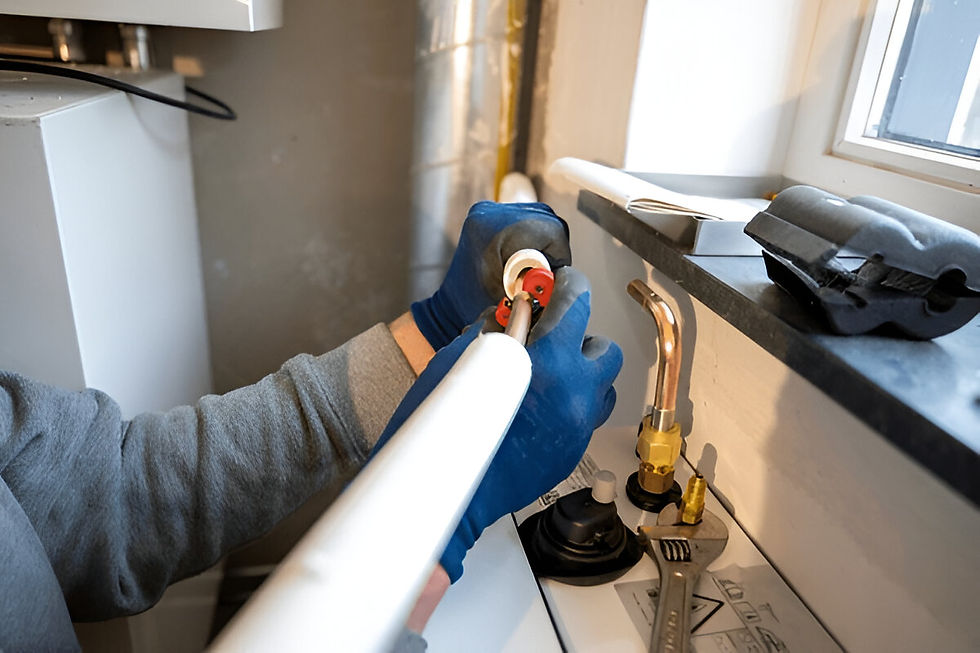Practical Guide to Choosing Plumbers for Efficient Hot Water Service
- Emma Smith
- Aug 8, 2025
- 4 min read
Updated: Nov 6, 2025

A reliable hot water system is essential for everyday comfort, whether for showers, cleaning, or cooking. When your hot water service fails, finding a skilled plumber becomes urgent. However, not all plumbers specialize in hot water systems, and choosing the wrong professional can lead to inefficient repairs, recurring issues, or even safety hazards.
This guide provides a step-by-step approach to selecting the right plumber for your hot water service needs. From verifying credentials to assessing experience and customer reviews, we’ll cover everything you need to make an informed decision.
Understanding Your Hot Water System Needs
Before hiring a plumber, it's important to understand your hot water system. Common types include:
Electric Storage Tanks – Use heating elements to warm water stored in an insulated tank.
Gas Storage Tanks – Heat water using a gas burner, often more energy-efficient than electric models.
Instantaneous (Tankless) Systems – Heat water on demand, providing endless hot water but requiring higher upfront costs.
Solar Hot Water Systems – Use solar panels to heat water, reducing energy bills but needing backup heating in cloudy weather.
Heat Pump Systems – Extract heat from the air to warm water, highly efficient but sensitive to cold climates.
If your system is malfunctioning—whether it’s inconsistent heating, leaks, or no hot water at all—a qualified plumber can diagnose and fix the issue efficiently.
Checking Licenses and Certifications
A licensed plumber ensures compliance with local regulations and safety standards. Here’s what to verify:
Plumbing License – Ensure the plumber holds a valid license from a recognized authority (e.g., state licensing board).
Gas Fitting License (if applicable) – Required for plumbers working on gas-powered hot water systems.
Insurance Coverage – Protects you from liability in case of accidents or property damage during repairs.
Avoid unlicensed handymen, as improper installations or repairs can lead to gas leaks, electrical hazards, or voided warranties.
Evaluating Experience and Specialization
Not all plumbers specialize in hot water systems. Look for professionals with:
Proven Experience – At least 5 years in installing, repairing, and maintaining hot water units.
Brand-Specific Knowledge – Some plumbers specialize in certain brands (e.g., Rheem, Rinnai, Bosch).
Diagnostic Skills – A good plumber should quickly identify issues like faulty thermostats, broken heating elements, or sediment buildup.
Ask potential plumbers about their experience with your specific system type—whether it’s a traditional tank or a modern tankless unit.
Comparing Pricing and Getting Written Quotes
Hot water repairs and installations vary in cost. To avoid overpaying:
Get Multiple Quotes – Compare at least three estimates from different plumbers.
Understand the Breakdown – A detailed quote should include labor, parts, and any additional fees.
Beware of Lowball Offers – Extremely cheap services may indicate subpar parts or inexperienced work.
Ask if the quote is fixed-price or hourly—unexpected delays can increase costs with hourly rates.
Assessing Response Time and Availability
Hot water emergencies can’t wait. Consider:
24/7 Emergency Services – Some plumbers offer after-hours repairs for urgent breakdowns.
Guaranteed Appointment Windows – Reliable plumbers provide clear timeframes rather than vague "morning or afternoon" slots.
A prompt response ensures you’re not left without hot water for days.
Verifying Warranty and After-Service Support
A trustworthy plumber stands behind their work with:
Labor Warranty – Covers repairs for a specified period (e.g., 12 months).
Manufacturer Warranties – Ensures parts are covered if defects arise.
Follow-Up Services – Some plumbers offer free check-ups after installation.
Always request warranty terms in writing before work begins.
Asking the Right Questions Before Hiring
Before finalizing your choice, ask:
"Are you experienced with my hot water system model?"
"Do you offer a guarantee on your work?"
"Will you handle permits if needed?"
"What’s the estimated completion time?"
Clear answers indicate professionalism and transparency.

Red Flags to Avoid When Hiring a Plumber
Be cautious of plumbers who:
Demand Full Payment Upfront – Reputable plumbers typically take a deposit, with the balance due after completion.
Lack Proper Identification – Licensed plumbers should provide credentials upon request.
Don’t Provide Written Contracts – Verbal agreements leave room for disputes.
Use Pressure Tactics – Avoid those pushing unnecessary upgrades or scare tactics.
Maintaining Your Hot Water System Post-Service
Once your system is repaired or installed, follow these maintenance tips:
Annual Servicing – Prevents sediment buildup and extends system life.
Checking for Leaks – Address minor drips before they worsen.
Adjusting Temperature Settings – Optimal settings (around 50°C/120°F) balance efficiency and safety.
Regular maintenance reduces future repair costs.
Conclusion
Choosing the right plumber for your hot water service ensures efficiency, safety, and long-term savings. By verifying licenses, checking reviews, comparing quotes, and asking the right questions, you can avoid unreliable technicians and enjoy uninterrupted hot water. Invest time in selecting a qualified professional plumber, your comfort and peace of mind depend on it. If you follow this guide, you’ll be well-equipped to make an informed decision and keep your hot water running smoothly for years to come. Need expert hot water service? Contact a licensed plumber today for a consultation!







Comments